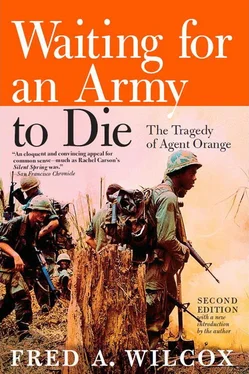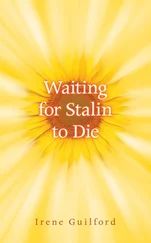Angered over having undergone minor surgery, only to be told that he might never find out the results of lab tests performed on the dime-sized pieces of skin removed from his arms, Naples went to Victor Yannacone, attorney for Vietnam veterans in their suit against the VA for gross negligence, to see if the slides could be subpoenaed. But Yannacone told Naples this wasn’t possible, that the slides had obviously disappeared and little could be done to find them. The rash continued to spread over Naples’ forearms, thighs, calves, stomach, and face, making him so uncomfortable at times that he couldn’t sleep. And when the Manhattan VA called to say the doctors there would like to take a look at his lesions, Naples thought that perhaps he might get help after all.
“They called us in,” says Naples, “and on the day we got there, all of a sudden the doctor was called away. So we went home. And they call us back a second time and we went in to see the doctor, and she was friendly, really responding to us, genuinely interested in the rashes. And then she said, ‘Oh, I’ve got to make a phone call. I’m gonna try to call the Bronx VA to find out just what happened to those slides.’ She went out of the room for a few minutes, came back in and announced: ‘Okay, Joe, we’ve found out what we needed to know, you can go home now, we don’t have to do anything more.’ I had hand-carried my records to Manhattan, signed a release of information form so they could get whatever they needed, and I said, ‘What about this release of information form I signed?’ And she said, ‘No, when your lesions come back up you come and see me then.’ And since then we haven’t heard anything more about it. The thing was, she was really warm, friendly, till she made that phone call , and then all of a sudden it was zap, gone , just get outta here.”
While Joe Naples and Bobby Sutton talk, I think about the many times I have seen men like them leaving a steel mill in Gary, Indiana, an auto assembly plant in Detroit, or a coal mine in West Virginia, lunch box under the left arm. And in how many neighborhood bars we have sat together on a Saturday afternoon, chugging shots and sipping beer while watching reruns of sporting events. But for Naples and Sutton, that was before Vietnam. Because of the slow debilitating effects of dioxin and phenoxyacetic acid, they find it difficult to work, and the damage to their livers rules out drinking.
“I thought the stuff they were spraying was insect repellent,” says Naples, “and of course some of it was. But I didn’t know nothin’ about herbicides at the time. When I first got to Dong Tam, there was a lot of vegetation. But by the time I left, the mangrove forest that had been there was so burnt out we ended up playin’ softball on it. And I hear from Bobby that when he got there the place was almost like a desert.”
“Listen,” Sutton says, “when a place is so fertile that you can take a piss and ten minutes later something will grow there, you know somethin’s wrong when it turns to muck, just dirt.” Opening one of his photo albums, Sutton points to a picture of something that resembles a brown sheet of construction paper superimposed on a tiny pool table, leaving only a thin green margin. “There it is,” he says, pointing to the brown sheet, “that’s the softball field Joe’s talkin’ about. One time it was jungle, but that’s the way it looked in 1969.”
“Before I entered the service,” Naples continues, pulling his sleeves carefully over his forearms, as though by covering the chloracne he can stop the rash from spreading or anesthetize the terrible itching and burning, “I lettered in almost every sport in high school. I was on the wrestling team, played Triple A baseball, and had no physical problems whatsoever. But for the past ten, maybe twelve years, I’ve had these rashes that have gotten progressively worse. I’m losing my balance. I’m dizzy, I’ve got constant headaches. My eyes are sensitive to light, and I’d just say my health has been goin’ downhill most of the time. As time goes by, it just gets worse.”
Charlotte Naples nods painfully in agreement after each statement, massaging her husband’s arms and occasionally whispering encouragement. During his three-year tour of duty, Naples was “mostly involved in reconnaissance, setting up ambushes, intercepting gun runners and tax collectors.” He was wounded three times—once in the neck by a .30-caliber machine gun—and was with “the very first group, or one of the first,” to enter Cambodia in 1966, four years before the war “officially” spread to that country. He was in his teens when he went to war; but now, though he has not yet celebrated his thirty-fifth birthday, he feels like an old man, confused, bewildered, angry at the nation that seems to want to punish him for the thirty-six months he spent in combat.
“If I might interject,” says Sutton, obviously in pain and impatient to talk about his long struggle to get the VA to recognize his many ailments as genuine and service-connected. “It’s really ironic, because I would say that Joe and I have about 95 percent of the same symptoms, only he doesn’t vomit after meals like I do. I’ve had the headaches, abnormal electroencephalograms, chronic diarrhea, a Class I enlarged prostate gland, my sperm looks like tapioca pudding, and after four years of trying, my wife and I lost our first child after a half-term pregnancy, which really set both of us back. My knees buckle from under me, and I have photosensitivity of the eyes, that’s why I have to wear sunglasses. I suffer from peripheral neuropathies. The VA says I don’t have them, but they’ve issued this device to kill the pain they say I don’t have,” lifting his shirt and pointing to a small box from which several wires protrude. “The box is supposed to send electrical impulses which will block the pain messages to my brain; that’s why I have these electrodes attached to my lower back and thighs. But I ache all over, really. I get pains that come right out of left field, the left-field bleachers, and it hurts, that’s all.
“And another thing, they try to treat us like psychos at the VA. You’re automatically a drug addict, baby burner, or maniac. Every time anybody goes in it’s the same questions: ‘What kind of drugs are you takin’,’ and ‘You’re an alcoholic, aren’t you?’ Hell, Joe can’t drink. I can’t drink. A lot of vets can’t even take one beer without fallin’ on their ass. One beer, man, and I’m just done.”
Naples nods, shakes his head sadly, and, lighting a cigarette, adds, “When I went into the clinic with my lesions they asked me if I wanted to see a psychiatrist. And I said, ‘Sure, why not?’ But it wasn’t because of the lesions. I wanted to see him because I was gettin’ the nightmares and flashbacks. But the first thing they ask you is, ‘You’re an alcoholic, aren’t you?’ Any Nam vet that has been in contact with herbicides will tell you that you can’t drink. You have a headache that will last for three days, and it starts while you are drinkin’; I mean you’re actually hung over after just a few sips of beer. And you’ll vomit your intestines out, for christsake. I take a drink of beer now and I’m just gone. Before even a half of a can goes down the headache is there, it just starts pounding.”
“Dioxin,” Sutton explains, “collects in the fatty tissues of your liver, and you can’t filter out the poisons. It also affects the DNA process. When a baby is forming in the womb and the genes are splitting to form the phalanges, the facial muscles, the different organs, just one molecule of dioxin can take the place of a normal gene splay. And that’s where you get polygenetic birth defects, the same as the Vietnamese people are having.”
Читать дальше











